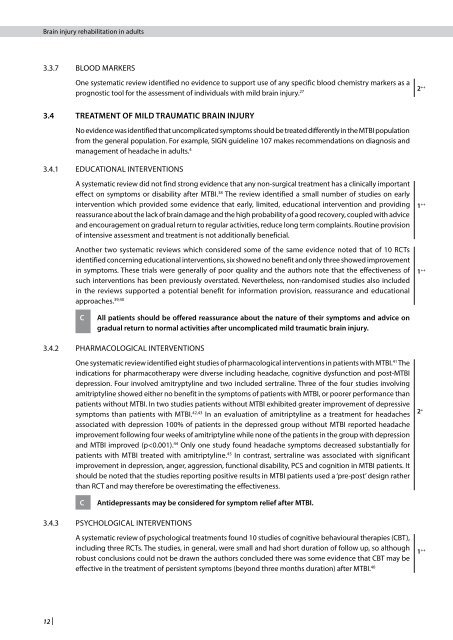sign130
sign130
sign130
Create successful ePaper yourself
Turn your PDF publications into a flip-book with our unique Google optimized e-Paper software.
Brain injury rehabilitation in adults<br />
3.3.7 BLOOD MARkERS<br />
12 |<br />
One systematic review identified no evidence to support use of any specific blood chemistry markers as a<br />
prognostic tool for the assessment of individuals with mild brain injury. 27<br />
3.4 TREATMENT of MIlD TRAuMATIC BRAIN INjuRy<br />
No evidence was identified that uncomplicated symptoms should be treated differently in the MTBI population<br />
from the general population. For example, SIGN guideline 107 makes recommendations on diagnosis and<br />
management of headache in adults. 4<br />
3.4.1 EDUCATIONAL INTERVENTIONS<br />
A systematic review did not find strong evidence that any non-surgical treatment has a clinically important<br />
effect on symptoms or disability after MTBI. 38 The review identified a small number of studies on early<br />
intervention which provided some evidence that early, limited, educational intervention and providing<br />
reassurance about the lack of brain damage and the high probability of a good recovery, coupled with advice<br />
and encouragement on gradual return to regular activities, reduce long term complaints. Routine provision<br />
of intensive assessment and treatment is not additionally beneficial.<br />
Another two systematic reviews which considered some of the same evidence noted that of 10 RCTs<br />
identified concerning educational interventions, six showed no benefit and only three showed improvement<br />
in symptoms. These trials were generally of poor quality and the authors note that the effectiveness of<br />
such interventions has been previously overstated. Nevertheless, non-randomised studies also included<br />
in the reviews supported a potential benefit for information provision, reassurance and educational<br />
approaches. 39,40<br />
C All patients should be offered reassurance about the nature of their symptoms and advice on<br />
gradual return to normal activities after uncomplicated mild traumatic brain injury.<br />
3.4.2 PHARMACOLOGICAL INTERVENTIONS<br />
One systematic review identified eight studies of pharmacological interventions in patients with MTBI. 41 The<br />
indications for pharmacotherapy were diverse including headache, cognitive dysfunction and post-MTBI<br />
depression. Four involved amitryptyline and two included sertraline. Three of the four studies involving<br />
amitriptyline showed either no benefit in the symptoms of patients with MTBI, or poorer performance than<br />
patients without MTBI. In two studies patients without MTBI exhibited greater improvement of depressive<br />
symptoms than patients with MTBI. 42,43 In an evaluation of amitriptyline as a treatment for headaches<br />
associated with depression 100% of patients in the depressed group without MTBI reported headache<br />
improvement following four weeks of amitriptyline while none of the patients in the group with depression<br />
and MTBI improved (p


